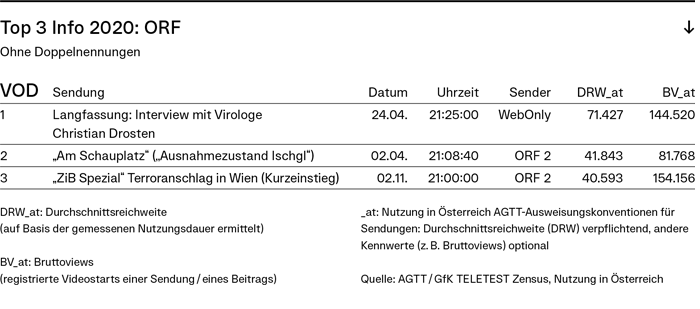Back to overview
Eva Reiter-Kluger, Head of TVthek
#91 What mindset does innovation need?
"The Internet will not be a mass medium in the foreseeable future." This is what a prominent futurologist predicted at the beginning of 2001. A short time later, thanks to ORF online pioneer Stefan Lauterer, the first livestreams of the Bundesland heute broadcasts, which were still quite ridiculed at the time, went online. In 2005, those people who had already recognized the appeal of "watching TV when and where they want" were able to follow all nine broadcasts from the state studios online via a livestream. In 2009, the TVthek was founded. A showcase for ORF's television programming had been created in an online world that at the time was still often either viewed skeptically or not taken entirely seriously. Since then, ORF's public service video content has been played out - steadily growing - on all relevant platforms via TVthek. The use of moving images on the Internet has increased at an astonishing rate in the past decade; among young audiences, streaming usage recently overtook linear TV, and a trend reversal is out of the question.
The U.S. psychologist Carl Rogers said in his 1979 book "Learning in Freedom": "The only person who is educated is the one who has learned how to learn and how to change." This can be applied to ORF in general and to TVthek in particular, whose creators have learned in many ways: Through the history of TVthek's development, from a website with 70 shows available as video-on-demand and circa 20 livestreams to a platform with more than 220 regular shows, a broad livestream offering across all channels, numerous live special broadcasts and a history section with more than 3,000 videos from the ORF archive on Austria's contemporary and cultural history.
However, the TVthek has also developed further thanks to valuable feedback from users via customer service, comments in the apps, tips on Twitter and other social media, user surveys, and personal encounters with our viewers during ORF audience discussions. The TVthek team tries to check these tips quickly and implement requests as promptly as possible. This does not always happen as quickly as we would hope. Legal framework conditions such as the 7-day call-off period, which our audience often doesn't know exists or has no understanding of, are out of our hands. When it comes to usability improvements - whether it's age verification for adults to make shows with parental controls available all day or cross-device use - we still have some development steps ahead of us.

It was and is important to reflect on one's own mistakes and the will to constantly realign oneself while never losing sight of what one stands for: for ORF as a company, its credibility, diversity and its range of information, culture, sports and entertainment. And TVthek for making this offering accessible to as many Austrians as possible and staying in touch with people despite all the digital changes. The figures confirm that we are succeeding in this mission: In 2020, ORF TVthek was used by users more than ever before: according to internal statistics, the video platform achieved an average of twelve million visits (connected visits) per month in 2020, thus posting a record value since the video platform was established. But as pleasing as this snapshot is, we must look to the future. Once missed, it is difficult to make up for it. In order to be able to survive in the future, it is necessary to take on the challenges, in particular with regard to online forms of design and social media, in addition to the legal framework conditions. At this point, it is important for TVthek and all digital products that will follow to optimally combine the previous values and the new goals in the interest of the audience and the public service mission and to continuously face the opportunity process. Because as Einstein already noted, "The purest form of madness is to leave everything as it is and hope that something will change."




